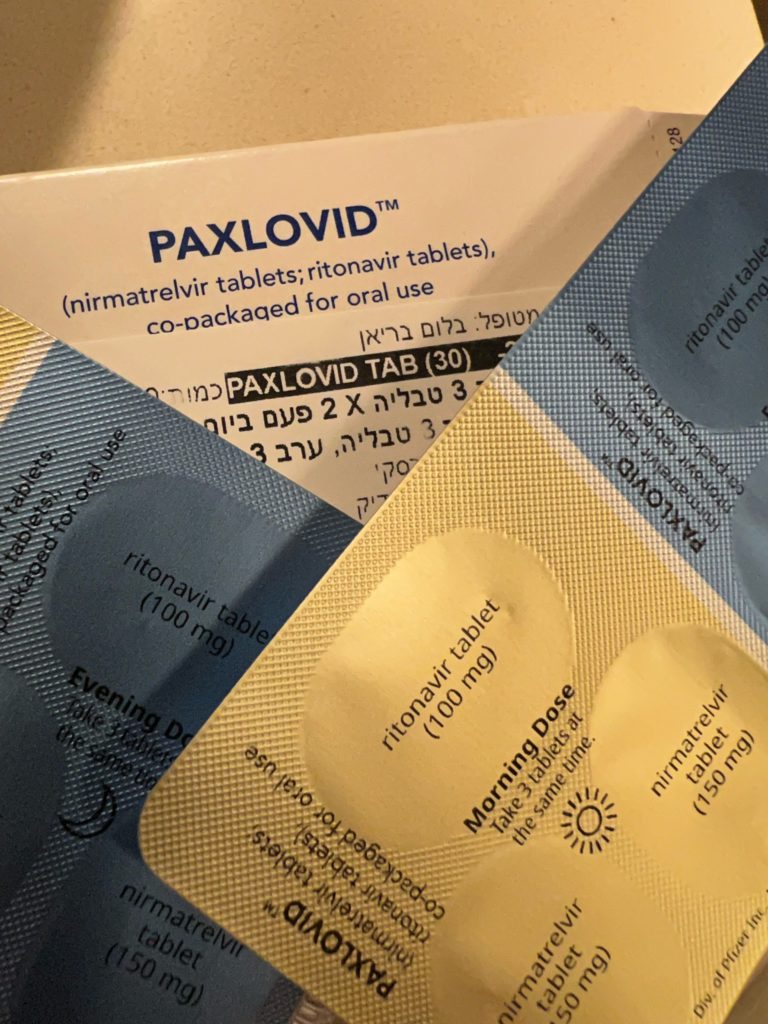I had finally resolved to go in for the Evusheld shot I wrote about recently (“How many antibodies are enough?”) – the prophylactic Covid treatment from AstraZeneca that injects antibodies into immunocompromised people like me who don’t create enough (or any) antibodies on their own from the vaccines.
But it was too late. After taking extreme precautions for over two years, I finally caught Covid.
Not just me but my entire family.
It’s easy to trace the chain of connection: Our daughter Merav, son-in-law Gabe and four-month-old Ilai got it from someone in Merav’s mothers’ group. (When someone flippantly posted on social media, “Babies never get sick from Covid,” I wrote back in fury, “Tell that to my grandson who spiked a fever of 104 degrees Fahrenheit and had to be rushed to the ER by ambulance!”) Jody and I caught Covid from them. Our youngest son Aviv caught it from us. And Amir, our oldest, presumably picked it up at a Purim party.
Friends who we told of our diagnosis were empathetic. “You were so careful! You got all the vaccines and boosters, you masked up everywhere.”
Everywhere except with our new grandchild. We had heard stories about grandparents who hadn’t seen their generational offspring for two years, to keep from catching Covid. Jody and I decided that was not going to be us.
We’d be careful: If anyone was feeling under the weather, we’d wear a mask. We ate outside whenever the weather permitted. We sometimes asked everyone to do a home antigen test before unmasking if an indoor Shabbat meal was the only option. Not being able to see our family was where we drew the line.
It worked very well. That is, until it didn’t.
Jody and I have both been very averse to catching Covid. Me, for obvious reasons: My cancer means we don’t know if my immune system will be functioning well enough to keep Covid mild. Jody just didn’t want to risk long Covid, which the latest stats say affects 13% to 30% of Covid patients.
Our symptoms started off mild a couple of days after our exposure. But the next day, Jody and I both spiked fevers. Twelve hours later, the results of our PCR tests came by SMS.
This time, we were positive.
I immediately went into damage control: If I hadn’t been able to get the Evusheld before catching Covid, the next best thing would be to get a package of Pfizer’s Paxlovid pills that reduces the chance of severe illness in people at risk by up to 89%.
According to a study published in the journal JAMA Network, some 2.7% of Americans are considered immunocompromised – that’s about 7 million people in total. Millions more have diseases, like AIDS and Crohn’s that impact immunity.
The immunosuppressed have a higher chance of hospitalization and death than healthier individuals, take longer to clear the virus and are increasingly known as being a vulnerable vector for incubating new variants. An Israeli study conducted during the Delta variant surge found that 40% of hospitalized breakthrough cases are in immunocompromised people.
That’s definitely “a variant of concern.”
It took most of the next day to get the prescription approved by the “Covid committee.” Amir’s girlfriend, Tal, made the pilgrimage to the Maccabi Pharm Agrippas Street to pick up the meds.
“You may have saved my life!” I gushed to Tal. I wanted to impress upon her exactly how grateful I was.
Paxlovid is a big commitment: Three large pills, twice a day for five days.
I don’t know if it was the Paxlovid or my immune system is working as it’s supposed to, but within five days, my symptoms started to subside. My fever went down, the coughing decreased, and my headache transitioned into more of a dull throb than a piercing knife.
Jody’s recovery was not as rapid as mine, which got me thinking: Why can’t Paxlovid be given to anyone with Covid, not just those at high risk. I know all the usual reasons: it costs some $500 for a course of treatment and there aren’t enough pills yet in the country.
But maybe this treatment – or something similar in the future – will be what transforms Covid-19 into something more akin to the flu (just as the anti-vaxxers have been clamoring for). If priced right and made ubiquitous like antibiotics or antivirals such as Tamiflu, Paxlovid could become the latest must-have accessory to pack in your luggage. (“Got my eye patches, my hiking boots and my Paxlovid!”)
That looks more likely after the announcement from Pfizer that 30 companies around the world, including Teva in Israel, will begin producing a generic, low-cost version of Paxlovid. Pfizer says it will not receive royalties from sales of generic Paxlovid.
For two years, I’d been terrified of Covid. In the end, it wasn’t as bad as I’d imagined. I’m well aware that, had I caught the virus before there were vaccines, pills like Paxlovid or prophylactics like Evusheld, my outcome could have been tragically different. For me, Paxlovid has been nothing short of a miracle.
Plus, there’s an ironic silver lining. As it’s unlikely any of us will be reinfected with whatever variant we got just now (was it Delta? Omicron? Deltacron?) in the coming months, maybe we can feel just a tad less anxious about eating indoors or taking our masks off at a rock concert.
At least until the next variant arrives.
I first wrote about Covid and Paxlovid for The Jerusalem Post.


